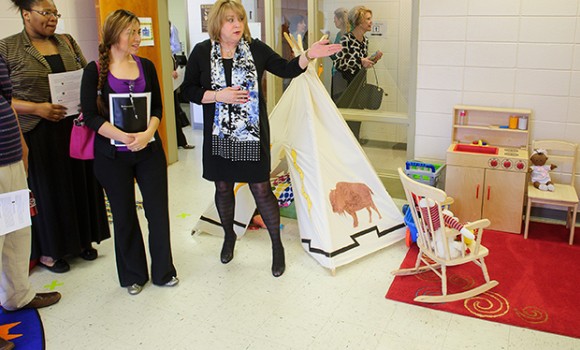High Point Center for Children and Families Opens
High Point Center for Children and Families Opens

UNCG’s Wanda Dodson-Hoff (right) talks with visitors to the new High Point Center for Children and Families and Victim’s Justice Center.
Two new facilities are now open in High Point to address the gap in early childhood services and family wellbeing – and UNCG had a big hand in making them a reality.
More than 100 people from High Point and UNCG attended the opening Wednesday of the High Point Center for Children and Families (HPCCF) and the Victim’s Justice Center (VJC). Both are located in Southside Recreation Center.
At the open house, High Point City Manager Strib Boynton discussed the city’s commitment to supporting children, families and victims of domestic violence. He praised UNCG’s work on the project, noting, “We have enjoyed a solid relationship with UNCG that goes back several years, and it’s always a pleasure to work with the university.”
Talk about a community-campus partnership! Sponsors who helped develop the intervention programs for young children and their families, as well as victims of domestic violence, are UNCG, the City of High Point, the United Way of Greater High Point and the High Point Police Department.
Then there’s the facility itself, furnished by donations from High Point furniture industry companies. A no-cost lease from the City of High Point made the 5,000-square-foot facility available. In-kind support for the effort totaled almost $390,000, with additional funding provided by the Millis family siblings: Molly, Emily and Bill. UNCG’s Center for Youth, Family and Community Partnerships will direct and coordinate programming for many of the initial intervention services.
The program will serve as a model of comprehensive child and family services delivered through an integrated system of community providers. UNCG will support community partners in implementing services and will evaluate program outcomes.
Dr. Chris Payne, who directs UNCG’s Center for Youth, Family and Community Partnerships, is serving as the executive director of the centers. She discussed the importance of the early years in a child’s development.
“Investments promoting positive development in the first three years of life have been proven to yield major returns later in life,” Payne said. “The HPCCF focus on early intervention makes the center much more than a stopgap for missing services. We would intervene with families early to prevent more serious and costly problems when children enter school.”
HPCCF clients will get services that include group and individual therapy for children and parents, transition to school activities, parent education classes, assistance for domestic violence victims, and structured activities to support family visitations for children involved in the child welfare court system.
The Victims Justice Center, which is housed in the HPCCF, is an outgrowth of the High Point Police Department’s highly successful Offender-Focused Domestic Violence Initiative. The VJC will bring police, legal and counseling services together in one location to aid victims of domestic violence.
High Point Police Major Kenneth Shultz will serve as program director for the VJC. “This center provides us with a further opportunity to break the cycle of violence,” Shultz said.
Working in concert, the HPCCF and the VJC will offer a comprehensive approach to improve the health, safety and wellbeing of vulnerable children, individuals and families.
Story by Steve Gilliam, University Relations
Photography by Chris English, University Relations







